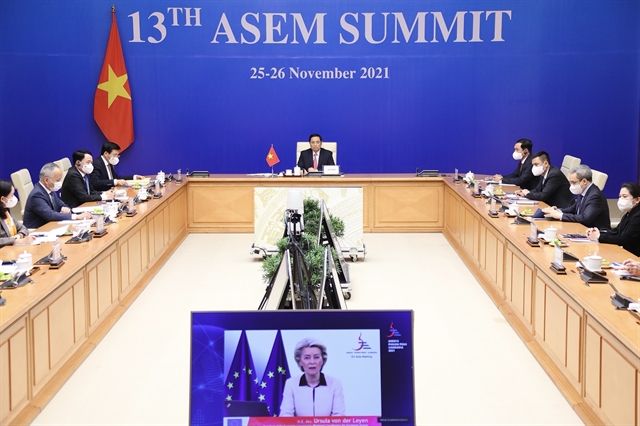
HÀ NỘI – Prime Minister Phạm Minh Chính on Friday proposed initiatives to promote cooperation between Asia and European countries in the future as he attended the 13th summit of the Asia-Europe Meeting (ASEM 13) via video conference.
The ASEM, or Asia-Europe Meeting, is a platform for countries in Asia and Europe to exchange views on regional and global issues and strengthen cooperation in a wide range of areas. The 13th ASEM summit with the theme "strengthening multilateralism for shared growth" was held virtually from November 25 to 26 and hosted by Cambodia in its capacity as current chair.
Speaking at the conference, Prime Minister Chính delivered profound and substantive comments on the situation in the world, the region, development trends and new problems facing Việt Nam and the Asia-Europe region.
The Prime Minister said that global challenges such as the COVID-19 pandemic, climate change, resource depletion, population ageing and cyber security were major issues and affecting everyone. He made four proposals to strengthen cooperation between the continents in the future.
Firstly, he proposed staying united for global cooperation because it would be impossible for any country to solve global problems alone. The Prime Minister also shared the opinions of ASEM leaders on the need to further promote multilateralism.
Secondly, he emphasised that the production and distribution of medicines and vaccines against COVID-19 must be conducted in the spirit of cooperation and equal access. On this occasion, the Vietnamese PM thanked developed countries in Europe and Asia for helping developing countries with vaccines, medicines and other medical equipment to cope with the pandemic.
Thirdly, Chính suggested that developed countries help developing countries to have the capacity to deal with global problems, such as acquiring an appropriate, large-scale and timely financial mobilisation mechanism for technology transfer, especially high technology and green technology.
Finally, the Prime Minister called for accelerating digital transformation, training human resources for developing and poor countries, and promoting public-private cooperation to mobilise resources for development. To contribute to this process, Việt Nam will organise the "ASEM Roundtable on Digital Economy" in 2022.
Also at the summit, the Prime Minister shared Việt Nam’s efforts and priorities in responding to the COVID-19 pandemic, while affirming that Việt Nam had and would make responsible contributions in resolving non-traditional security challenges, especially in global efforts to respond to climate change.
In that spirit, the Prime Minister once again proposed that European and Asian countries further open up import and export markets, increase investment and promote public-private cooperation to create more jobs.
He said that the whole world was witnessing rapid and unpredictable changes and such situations posed an urgent requirement for countries to step up multilateral cooperation on the basis of international law, the spirit of cooperation, sharing of responsibilities and contributions for the common good.
Leaders’ talk
During the summit, ASEM leaders discussed joint efforts and multilateral cooperation in addressing regional and global challenges, pandemic response, promoting inclusive and sustainable economic growth and recovery, and strengthening social and cultural connections.
They also shared their views on the political, economic and social situation in the two continents and discussed directions to further promote ASEM cooperation.
They spent a lot of time discussing solutions to deal with the COVID-19 pandemic and regain growth momentum. These include facilitating the circulation of essential goods and timely access to vaccines, technology transfer and expansion of vaccine production scale. In addition to maintaining a sustainable supply chain, facilitating trade and investment, green transformation, and digital transformation, they emphasised the importance of strengthening Asia – Europe connectivity.
They also shared the common perception that it is necessary to strengthen cooperation to ensure a peaceful and stable environment for development. They reaffirmed their commitment to maintaining peace, stability, ensuring maritime security and safety, freedom of navigation at sea and in aviation, and not obstructing economic activities in accordance with international law, especially the 1982 United Nations Convention on the Law of the Sea. VNS